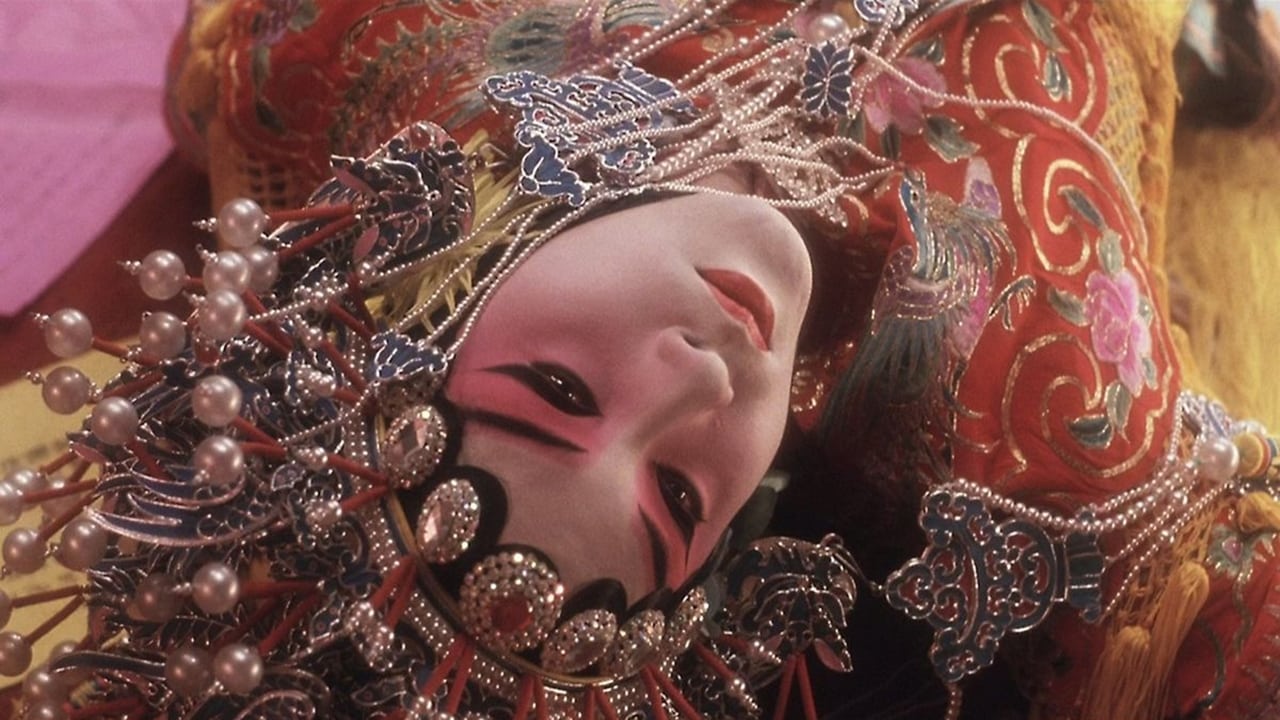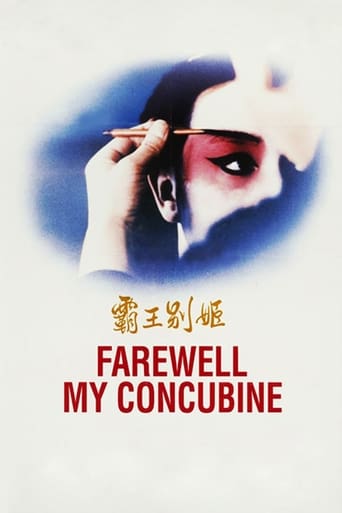

Who payed the critics
... View MoreIt is an exhilarating, distressing, funny and profound film, with one of the more memorable film scores in years,
... View MoreOne of the best movies of the year! Incredible from the beginning to the end.
... View MoreClose shines in drama with strong language, adult themes.
... View MoreOne of the most precious article of China. the print of Chinese culture, life and emotions in that times.
... View MoreMasterfully scripted, acted and filmed, "Farewell, My Concubine" evokes the genius cinematography of Scorsese, complimented with the harsh reality captured by the likes of David Lean. The story is unique, and gives us an insider's view into the changing face of China, decade by decade, as seen from a trio of characters who comprise a tragic love triangle. Gong Li is incredible as a strong-willed "dragon lady" raised in a brothel who will stop at nothing to achieve her own ambitions, yet who also wants to see new husband succeed as well. The music, costumes and overall sets are spectacular. This is not an uplifting film, but then again, neither is Chinese history.
... View MoreIt came astounding to me that a Chinese movie made in 1993 could present so delicately people on such personal levels, as real imperfect human beings, without a haunting habit of moral judgment. As a movie that has a story line flowing with the stream of history, it is better that Huo Zhe, the highest rated Chinese Movie to date, in an artistic sense. May be because the protagonist, a true artist, is much more sensitive, idealistic and paranoid, thus giving the movie more color and vigor. The story of Huo Zhe on the other hand, is applicable to the majority of Chinese, the ones that do not fight back. Also this is a masterpiece where not even one line or one scene is abundant.This is not a movie to be missed. The story telling is friendly to those who have a limited knowledge of Chinese history.
... View MoreI have had a great deal of trouble writing this review. Every time I make a start I can find nothing to get my teeth into and no coherent thread to interconnect my thoughts. While there are many potential sub-topics they all seem to stand in isolation. While this may simply be a reflection of my inability to string two sentences together I think in this case it pretty accurately summarizes the issues I have with this movie.It is difficult to figure out what this movie is and if asked to summarise it in 25 words or less I would be flummoxed. Is it a Chinese history movie? An opera movie? A Chinese culture lesson? A love story? A story of betrayal? A story of pseudo or actual homosexuality? It is snippets of all of these and probably more, but it does not really do justice to any of them. Basically it suffers from multiple personality disorder and unfortunately we don't get enough time with any of them to relate to any of them. Yes, the history and cultural aspects are interesting in their way but don't really add anything to our understanding of the horrors of the Japanese invasion of China, the Nationalist/Communist struggle, the early Communist era and the later Cultural Revolution. Yes, it is a "love story" between the two actors who play the King and the Concubine, but we never experience any passion or come anywhere close to connecting to either of these characters to really care. The "King" character in particular is very undeveloped, little more than a cardboard cut-out who happens to be the object of the "Concubine's" unrequited love. The character played by Gong Li is also skin deep and we never really care about her or her relationship with the "King" actor – indeed the random and non-sensical way in which these two characters become engaged simply nukes any credibility that this relationship might have had, and by extension destroys the credibility of any other relationship on the movie, most importantly the pivotal one between the "King" and the "Concubine". The betrayal, which I gather meant something personal to the director, is dealt with too curtly to have any effect at all. The character of the "son", raised from an abandoned baby, is totally illogical and we simply don't get to know him well enough to care about him or understand why he would possibly want to betray his adoptive parents. It all just seems facile and silly. We never really understand (or at least, I don't) the "homosexual" overtones of the "Concubine". Was he simply beaten into a form of insanity in which he thinks he is always in character as a woman? Is he actually a homosexual? His "king" friend seems to be too thick to understand the "Concubine's" feelings for him and this to me trivializes the whole "affair". And to be honest, none of the characters come across as being particularly nice, in fact the Concubine character comes across more as a petty, whinny, jealous, lightweight flake than a tragic figure we could weep for.OK, just because a film is not perfect doesn't mean you should not watch it. "Farewell My Concubine" is one of those films which is a "must see" despite its failings. If it falters as an emotionally satisfying and coherent movie it is a stunning technical tour de force and a masterpiece of its kind. Just to have made a movie of this scope is an achievement, almost to the point that its success is secondary, crazy as that may sound. It is a movie of such breadth that it is impossible to take in completely in one sitting, and that is perhaps the ultimate test – you know you need to see it again to understand it but can you care enough about it to make that effort? But – trust me - you need to see this movie – your education as a movie goer is incomplete unless you do. You will enjoy it, and you will be moved to have an opinion, one way or the other.
... View More